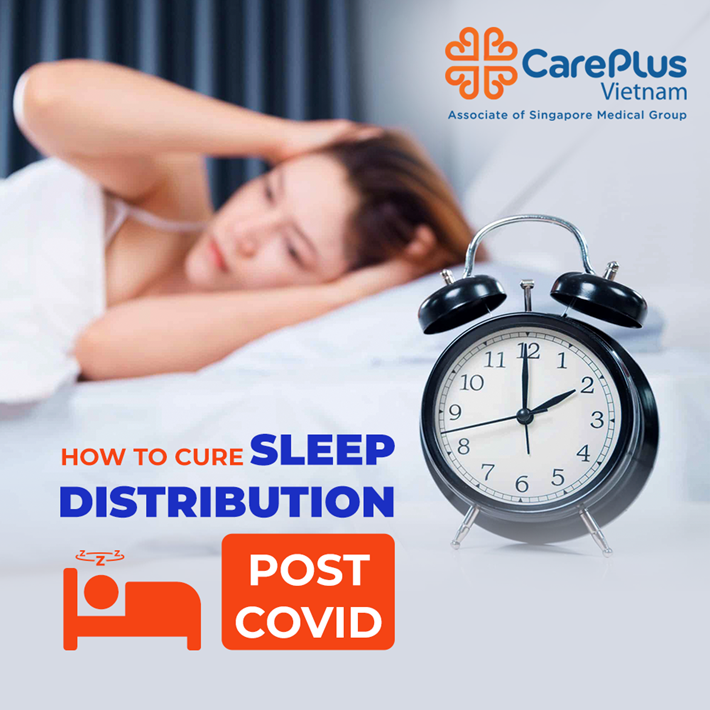How to cure sleep distribution post covid
After post-covid, many people still have symptoms such as fatigue, pain, difficulty sleeping, shortness of breath, etc. These are called post-Covid-19 certificates. In particular, sleep disorders, insomnia As a result, many people have problems. Why users from Covid-19 may face this certificate, let's follow up with CarePlus and how to handle it effectively?

3/16/2022 8:48:45 AM
1. Why are there post-COVID-19 symptoms?
The recovery after COVID-19 still leaves long-lasting symptoms for patients such as: shortness of breath, cough, heart palpitations, joint pain, fatigue, weakness, loss of smell, difficulty sleeping, forgetfulness... , many people face insomnia after Covid.
Many patients suffer from insomnia after Covid due to feelings of anxiety, loneliness, and even depression. Especially for those who have lost their loved ones or loved ones after recovering from Covid, they experience severe sequelae, causing serious health damage. Besides the measurement is fear because of the impact of the disease, worry about the future, economic difficulties ... causing many people to experience stress, leading to insomnia, weight loss ...
2. How does post-Covid-19 insomnia happen?
After Covid, the patient's health declines, may experience instability problems in many organs in the body, leading to insomnia and difficulty sleeping.
Many patients have feelings of anxiety and depression after recovering from COVID-19. Fear of illness, anxiety because of economic difficulties add to stress, leading to insomnia.
- After recovering from the disease, if there are sequelae, you may need to use medicine to treat. However, these drugs can cause side effects including insomnia. If you take a lot of sleeping pills, it can cause addiction to the drug, leading to more severe insomnia.
3. What should be done to reduce post-Covid insomnia and prevent health effects?
Early examination after recovering from Covid-19 is the best way that everyone should do to help prevent insomnia and other sequelae.
In addition, what to do after recovering from Covid is that if you still have a cough, fever, difficulty breathing, or have sleep disturbances, fatigue, etc., you need to see a doctor to do the necessary tests. From there, it will determine whether the symptoms are post-Covid or not and have timely and proper treatment.
Currently, there are many effective methods to support and prevent Covid-19 as well as post-Covid, including vaccines, oral drugs, treatment regimens and ways of care. On the other hand, people have also gradually gotten used to the effects of the pandemic on daily life, so they have adapted better, knowing more and more how to prevent and treat when they get sick as well as when they have recovered.
Another thing to do is to spend time doing healthy things such as: Exercise, learn useful knowledge to take care of your body and mind, how to prevent Covid-19 infection...
4. Take anti-insomnia medication after recovering from COVID-19
For people with stress, mild depression that causes insomnia may require medication. But psychological and psychiatric medications after COVID-19 should be used in moderation to avoid the patient becoming addicted.
Many patients after the end of COVID-19 have often been unable to sleep. After using the usual sleeping pills still not helping. They end up taking heavy sleeping pills that have adverse, possibly addictive side effects.
5. Psychotherapy
Psychotherapy includes communication therapy, counseling, patient understanding of COVID-19 symptoms, symptom relief measures to reduce anxiety.
Those with stress, anxiety and psychological effects should talk to their doctor for advice and to understand more about how to cope with and overcome the effects of COVID-19.
When there is a complete, balanced diet with vegetables, fresh fruits, and less processed meat, there is no need to take additional vitamins or supplements. However, it should be noted to limit eating sweets with a lot of sugar, do not drink alcohol, smoke cigarettes, avoid drinking a lot of coffee or tea because it can make it difficult to sleep.